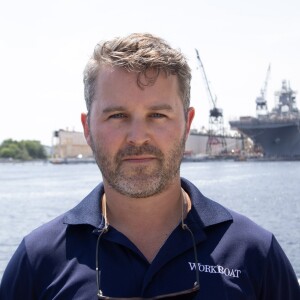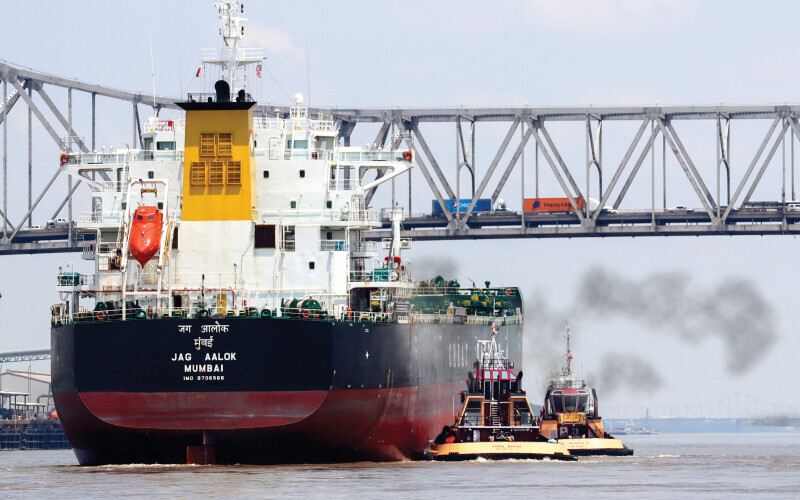In a recent discussion with WorkBoat, Brett Hewitt, senior vice president in Wells Fargo’s marine finance team, shared his insights into the trends and challenges he’s witnessed in the maritime sector. With a focus on Jones Act vessels and equipment finance, Brett shed light on the industry's dynamics and what he’s seeing play out through the eyes of his clients and shipyard contacts.
WB: Could you tell us about your background in the maritime industry and your role at Wells Fargo?
BH: I’m senior vice president, part of Wells Fargo’s marine finance group within Wells Fargo Commercial Bank, which has an equipment finance focus. I've been with the bank for a little over five years. Before Wells Fargo, the majority of my career was spent at GE Capital. The neat thing about both institutions was the value and importance on industry specialization.
At Wells Fargo, we focus on industries that are strategic to the economy. The maritime industry is a niche industry that is very important to the movement of goods and cargo, which affects how the economy functions.
In my role, I'm continually helping to build meaningful relationships with clients of our bank, and specifically within our equipment finance group. Of course, we're in the business of lending money and trying to help businesses obtain the capital they need to grow, but where we try to be different is with our industry expertise. We have one relationship manager covering the Jones Act market, which allows us to share best practices we see from vessel operators across regions. Ultimately, it also helps us make quicker, smarter credit decisions when we're really plugged into an industry because a lot of this cycles. If you're a credit provider to an industry that’s cyclical, you don't want to be as reactive to those cycles. We have a much longer-term view of the maritime industry by way of our specialization.
WB: You mentioned trends working in cycles. So, what are some of the trends that you're seeing in brown water or the industry on the whole?
BH: I think our role as a lender to this industry is to be here, be ready and be able to help for whatever our clients need. There are lots of interesting trends in this industry right now and, as we look ahead, I think the main five that stand out the most are:
Number one, the full implementation of Subchapter M. It's been an overall huge positive for the industry, especially for safe navigation. It appears to be favoring larger operators that have more access to capital because, part of what's come out of Sub M is, companies must keep their fleets working and keep them COI compliant with the Coast Guard, which requires reinvestment. The bigger operators, I think, benefit in this case. However, some of the smaller ones, with the right planning, can get by just as well through Sub M.
Number two would be weather events. High water, low water, hurricanes and other unexpected events are becoming more frequent and forces operators to be nimbler; they have to have effective emergency planning contingencies. It’s important to have the right communications equipment on a vessel, excess parts on-hand at their field offices to fix mechanical issues that come up in a storm or preparation to ground on the bottom of the river during low water. Some operators decide to have their own shipyard, which gives them an inherent advantage to get a vessel back into service faster, or others have strategic relationships with third-party yards. These weather events seem more common today than they ever were, and we see our clients having to be better prepared. That’s a good thing!
Number three is the topic of new sustainable marine fuels, and those options that are available to vessel operators today. Whether it's renewable diesel, LNG, electric battery, hydrogen fuel cell, or ammonia, all these various fuel concepts show a lot of technical promise. However, each one has limitations to being able to bring it to market. The feedback we are hearing from our clients is that each operator’s fleet has its own nuance to it, such as where it operates, how far that vessel needs to go, what it’s carrying, and how much excess space onboard there is for a new fuel type. For these reasons, it remains to be seen which of these future fuels — the sustainable fuels — will emerge as a leader to help the industry reduce its carbon footprint. We're kind of in a test phase over the next 5-10 years.
Number four is higher costs due to inflation and supply chain issues. The industry is having to be disciplined on a range of expenses, from the high cost of steel and labor to the high cost of borrowing and interest rates. Vessel operators are strategically cutting costs or passing on these costs to their customers, which could have risk. In the last couple of years, however, you've seen freight day rates continue to rise in most commodities moved, showing that operators are getting better at passing along higher costs.
The fifth and final emerging trend that we see impacting the industry is the mariner shortage. It's a challenge to attract, hire, retain and promote the right people to work these vessels and to run these big companies. As I look ahead, vessel operators that can best take advantage of the transfer of knowledge from their more seasoned, older workforce to the younger generation are truly going to be the ones that are more successful. All the changes I mentioned above in vessel technology, regulation, increased weather events, and higher costs pale in comparison to not having enough competent workers to run your company and run it safely. A lot of other industries don’t face the same safety concerns as in the marine industry, so it’s important to retain, attract, hire and promote experienced workers. Also, the companies that can best manage succession planning will be the ones that end up leading the industry 10 to 20 years from now, in my opinion.
WB: You attended Argus Sustainable Fuels Conference last September in Houston, what were a few of the biggest takeaways that you had from attending that conference?
BH: I was asked to participate in a four-person panel on sustainable marine fuels and how operators are financing the investment in their fleet or future marine fuel technologies.
The reality is most of the marine transportation worldwide is dependent on the use of traditional fuels, however that means there's a lot of opportunity as the sector looks for ways to become more sustainable. We're seeing vessel operator clients in the Jones Act trade, specifically, doing strategic reviews of their fleet today. They're –exploring if the new fuel source is abundant in supply, if it’s available where they need it and can it be scaled, and if implementing it would be disruptive to the operation of their fleet. They also want to know if it’s affordable and how long it would take to recoup their investment. Smart operators are already having conversations about reducing their carbon footprint and making sure their customers are onboard.
As a financial institution, Wells Fargo is actively engaged in sustainable financing, aligning with the broader goal of deploying capital toward sustainable projects. Brett concluded by emphasizing the importance of industry collaboration, strategic adaptation to emerging trends, and a focus on sustainable practices to ensure a maritime operator’s long-term success.

Disclosure:




